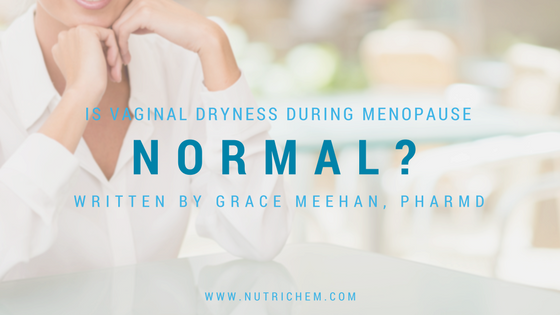
Is Vaginal Dryness at Menopause Normal?
Share
Written by Grace Meehan, Licensed Pharmacist and NAMS Certified Menopause Practitioner
What if I told you that 50% of post-menopausal women experience bothersome
symptoms of vaginal dryness and only 7% get treatment? You might wonder what the big deal is. Well, studies show that vaginal dryness has a negative effect on quality of life, can make women feel old, and can negatively affect sex life.
We know that there are definite health benefits to having sex, so addressing vaginal dryness is important. It can be uncomfortable regardless of whether you’re having sex. Burning, itching and irritation can be present and distressing, not to mention that you may experience an increase in urinary tract infections, vaginal infections and urgency.
Healthy vaginal tissue is thick and contains many folds making it elastic in nature. This elasticity helps it to stretch during sex. As women arrive at menopause, estrogen levels fall and so does the elasticity. The vaginal walls become thin, smooth, pale, and dry. With sexual activity, these thin walls may tear, bleed and become inflamed. (It’s important to note that any post-menopausal woman who is experiencing vaginal bleeding should report it to their health care provider).
The microbiome of the vaginal tissue shifts after menopause. In reproductive aged women, the vagina is home to lactobacilli bacteria that make lactic acid. The pH of the vagina then, is acidic in nature. Once women lose estrogen, the pH shifts to alkaline. Other possibly pathogenic bacteria can thrive at this new pH and potentially cause urinary tract and vaginal infections.
If you’re experiencing symptoms of vaginal dryness, there are treatment options.
Interestingly, regular sexual activity through menopause seems to help. The adage ‘use it or lose it’ fits here. Regular sex helps to keep the tissue thick and moist. Vaginal lubricants and moisturizers can be used to manage mild vaginal dryness. These help to decrease friction during sexual activity. Lubricants provide temporary relief of dryness and can be applied immediately prior to sexual activity.
They are oil, water or silicone based. Check with a health care provider before
choosing one, as some are not pH balanced for the vagina, and some contain
additives that can irritate. Vaginal moisturizers are applied a few times per week, and in contrast to lubricants, provide longer lasting effect for dryness. Moisturizers have been shown not only to provide moisture, but can lower the vaginal pH. Vaginal application of low dose estrogen can restore vaginal blood flow, improve the thickness and elasticity of the tissue, and decrease the pH. New studies have shown that vaginal application of DHEA (an adrenal hormone, non-estrogen) helps with all of these symptoms as well. Both of these require a prescription.
Oral or topical systemic estrogen is not the recommended treatment for vaginal
dryness. Applying estrogen to the vaginal tissue concentrates it where it is effective. Even if you are using systemic estrogen replacement, it is typically not sufficient to help vaginal health.
Not all women experience vaginal dryness with menopause, but if you do,
Nutrichem can help to answer your questions. One of our pharmacists can
recommend a great OTC product for you to try, or can direct you to one of our
clinicians for further help. You don’t need to suffer in silence.





2 comments
Hi Grace,
Is it possible to meet with you regarding my lichen sclerosis vulva and the medication I am taking for my menopause and dryness?
Thank you,
Diane
Dr. Manikkam had prescribed me a 0.1% estriol cream to apply to help solve my dryness problem. For awhile, it worked very well, but then I had a few instances of what I thought was minimal vaginal bleeding. Also I started to have some localized itchiness. I went to see my doctor about the bleeding issue; he suggested I stop using this product and I was also booked for a transvaginal ultrasound to check for any possible abnormalities (my mother had endometrial cancer in her 70’s, so I think they were being very cautious). Findings from this exam were normal. And, I am beginning to think the small episodes of bleeding may be due to something else (they have happened each time only after I go for a 5K run). But, I have not resumed taking the estriol cream. And so I am back to having to live with the vaginal dryness—and not really knowing what to do next…I think I probably will resume using the estriol cream for now, but would love to hear about other possible solutions!